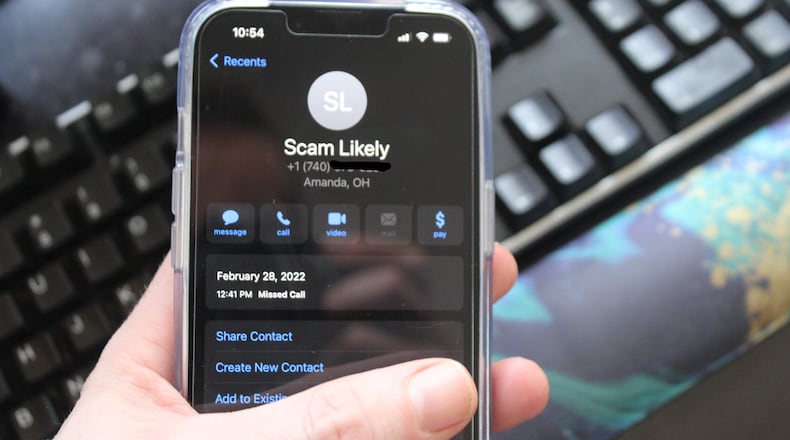But consumers can take steps to help reduce calls and bring bad actors to the attention of regulators and authorities, including those who are responsible for illegal robocalls.
“Our secret weapon is consumers — whom we urge to continue reporting illicit robocalls, so we can sever these unwanted illegal robocallers’ connection once and for all,” Ohio Attorney General Dave Yost said in a prepared statement last year.
Nearly 9.9 million phone numbers in Ohio are included on the National Do Not Call Registry.
When consumers put their phone numbers on the registry, it tells companies that they do not want to receive most telemarketing calls, says the Federal Trade Commission (FTC).
The FTC says telemarketers and sellers must remove numbers that are added to the registry from their call lists at least every 31 days.
But last year, the FTC received about 109,125 Do Not Call Registry complaints from consumers in Ohio, which was the second most per capita, behind only Delaware. Consumers in Butler, Champaign, Clark, Greene, Miami, Montgomery and Warren counties lodged about 9,150 complaints last year.
The Federal Trade Commission asks consumers to notify the agency when companies violate the Do Not Call rules.
Telemarketers must follow certain regulations, such as they are not allowed to try to sell products and services using robocalls unless Ohio consumers have given the businesses their written permission, says the Office of the Ohio Consumers’ Counsel.
In Ohio, telemarketers are required to provide consumers with their real names, the names of their companies, the purpose of their calls and information about what is being sold, the counsel said.
But that hasn’t stopped some companies and telemarketers from violating the law.
Do Not Call complaints submitted by Ohio consumers decreased by about 22% last year, says the FTC, and complaints saw even steeper declines in Montgomery, Greene, Clark and Butler counties.
But Warren County consumers submitted 1,200 complaints, which was up 7% from 2022. The FTC received 1,270 complaints from people in Miami County, which was a 78% increase from the previous year.
Miami County had the eighth most complaints per capita, out of Ohio’s 88 counties.
Officials say Ohioans should remember that adding a phone number to the Do Not Call Registry will not prevent all scammers from calling. They say consumers should be wary of businesses and sellers that use robocalls or that ignore the Do Not Call rules because it suggests they are scammers or do not have scrupulous sales practices.
The Ohio Attorney General’s office says it hopes the declining volume of complaints reflects its efforts to stop robocalls.
“AG Yost has prioritized decreasing the number of these calls targeting Ohioans,” said Steve Irwin, Yost’s press secretary. “His efforts include going after the people responsible for the calls.”
Last month, Yost and seven state attorney generals asked a federal judge to permanently ban one of the owners of a massive robocaller operation from working in the telecommunications industry.
The operators initiated more than 69 million robocalls to phone numbers associated with Ohio area codes.
The attorney generals said the Texas-based operation was responsible for billions of deceptive robocalls that offered extended car warranties and health-care services to people in Ohio and other states.
Later, one of the owners was accused of facilitating illegal and scam robocalls related to Amazon, government agencies and student loan services.
The companies allegedly called people on the Do Not Call Registry and “spoofed” calls to make it seem like they were coming from Ohio or legitimate phone numbers.
The FTC says consumers who get illegal robocalls should hang up immediately and they should not press any buttons or try to talk to a live person because this could lead to more unwanted calls.
Yost’s office says filing complaints about unwanted calls is part of the solution.
Even if Ohioans put their numbers on the Do Not Call Registry, they may continue to receive legal calls from political groups and some nonprofit organizations. Also, telemarketers can still call consumers if they have done business with their companies in the last 18 months.
Consumer advocacy groups say Ohioans who do not wish to be contacted anymore should ask these companies to put their phone numbers on their internal do not call lists.
Consumers can register phone numbers on the Do Not Call Registry online at donotcall.gov or by calling 1-888‐382‐1222 from the telephone numbers they want to register.
Consumers can report potential Do Not Call Registry violations to the FTC at www.donotcall.gov/report.html#step1.
Consumers who receive unwanted calls can complete an Unwanted Call Notification Form at www.OhioProtects.org. That information is directed to the Robocall Enforcement Unit, which says it uses the reports to identify trends to protect Ohioans.
About the Author




